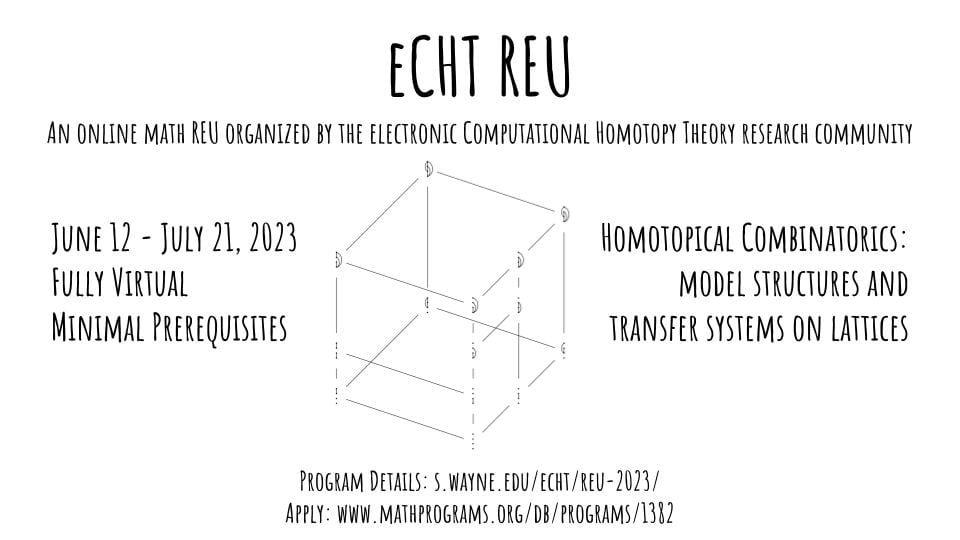
The electronic Computational Homotopy Theory (eCHT) research community is an NSF-sponsored project. Its goal is to provide an online home for a widely dispersed, international community of mathematicians who share similar mathematical interests.
eCHT is sponsoring a Research Experience for Undergraduates (REU) in Summer 2023. Our goal is not to completely reproduce the experience of an on-site REU. Rather, we aim to provide much of the benefit of participating in an REU for students who are unable (perhaps for personal reasons) to participate in an on-site program.
Kyle Ormsby (Reed College) and Christy Hazel (UCLA) will serve as project mentors.
Topic
The topic of the REU is Homotopical Combinatorics. Participants will explore and solve combinatorial problems at the heart of abstract and equivariant homotopy theory. In particular, they will study structural and enumerative properties of model structures and transfer systems on partially ordered sets. When the underlying poset is a finite chain, these are known to exhibit a rich class of Catalan-type properties, and we aim to extend these observations to other posets.
Eligibility and Selection criteria
All funded participants must be citizens, nationals, or permanent residents of the United States. We particularly encourage applications from members of groups that have historically been u nderrepresented in the mathematical sciences. We seek students who want to experience the benefits of an REU, but they are unable (perhaps for personal reasons) to participate in an on-site program.
Participants must possess mathematical maturity with proof techniques. This includes familiarity with reading and constructing proofs via induction, bijection, and inclusion-exclusion. Participants must have completed at least one proof-based mathematics course.
We prefer students with some or all of the following additional experience:
- experience with enumerative combinatorics.
- exposure to homotopy theory.
- experience with mathematical programming (in sage, python, or other languages).
However, these criteria are not required, only recommended.
Financial support
The REU will provide a stipend of $3,600 for the entire 6-week program. Additional grants up to $1,000 are available for students with demonstrated financial need. These grants are intended to subsidize the cost of participation, such as access to required technology.
Applications
We are accepting applications through the mathprograms.org website. Applications received by February 15, 2023 will receive full consideration.
We ask that applicants upload the following documents, all in pdf format:
- A resumé or curriculum vitae.
- Unofficial transcripts for all college-level coursework.
- A statement of purpose of 1–2 pages in length. This statement should address three topics. First, describe a theorem that you find particularly interesting, including something about its proof and/or applications. Second, describe your skills and viewpoints that will contribute to collaborative work with a diverse group of people with varying backgrounds. Third, discuss why an online REU is a good fit for your personal and professional goals.
We also require one letter of recommendation from a college or university faculty member who is familiar with your mathematical work. Recommenders should submit their letters directly to the
mathprograms.org website.
Applicants may also submit an optional statement of financial need if they wish to be considered for additional funds to subsidize the cost of participation. Applicants should read the technology requirements information before submitting a request.
Schedule
The REU begins on Monday June 12, 2023 and ends on Friday July 21, 2023. Tuesday July 4, 2023 is a holiday. All participants are expected to be fully available every day, Monday through Friday, during the hours of 12:00pm to 5:00pm Eastern Daylight Time (9:00am to 2:00pm Pacific Daylight Time).
The first two weeks will focus on getting students up to speed on relevant subject content. Activities will consist of lectures, discussions, problem sessions, and individual and group homework assignments. The subsequent weeks will transition to a research focus, with students split into teams focused on specific problems. Most time will be spent on collaborative and private research, but each day will feature a brief report to the full group, and each group will meet with faculty and postdoc mentors regularly.
Participant expectations
All funded participants are expected to fully commit to the work of the REU on its schedule. Participants are expected to be fully engaged during all official REU work hours. Students are welcome to work additional hours on the REU project, but that is not required or expected. The REU work day will consist of a variety of activities. These include full-group videoconferencing, small-group videoconferencing, one-on-one videoconferencing with program staff, and individual offline work.
Additional activities will occur from time to time, such as professional development activities and
activities of a more social nature to build community.
Technology requirements
All participants must have a device suitable for extensive video conferencing. This device should have reliable internet service, reliable audio, and a video camera. As a general rule, smart phones are insufficient. All participants must have a stable, comfortable, distraction-free environment from which to work. Examples include a private bedroom. All participants must also have a tablet, such as an iPad or Surface, or a graphics tablet. Wacom is one brand of affordable graphics tablet. These devices provide participants the chance to share written notes with others in real time. Communication will take place via Zoom, Jamboard, Zulip, and Overleaf.
 electronic Computational Homotopy Theory
electronic Computational Homotopy Theory